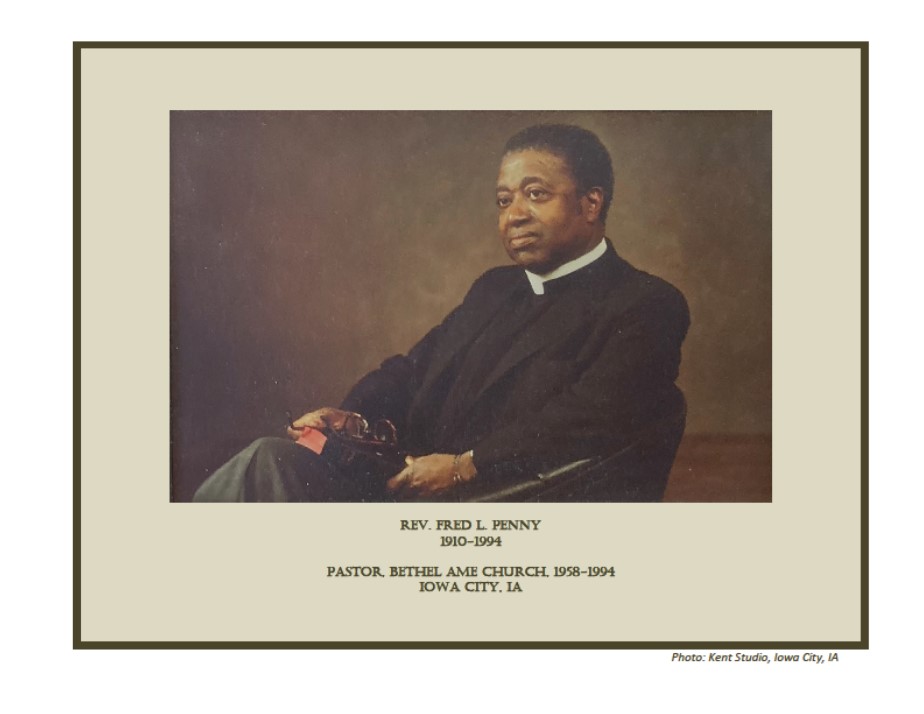FRED PENNY
1910 – 1994
He rescued the Bethel A.M.E. church from disrepair and growing irrelevance; a key leader in the African-American community.
In
1958, when the Rev. Fred Penny came to town with his wife and six
children, Iowa City wasn’t the diverse, welcoming place that we think
of today. But Penny was one of the people who made it so.
Before
reaching Iowa City, Penny preached in Chester and Sparta, Ill., and in
Muscatine. A year later the Bishop of his A.M.E. church sought a
preacher for Iowa City, a place where the church itself (which dated
from 1868) was in disrepair and the permanent congregation included one
elderly woman. It was considered a most difficult assignment, and it
would have been impossible for someone of less substance. The place had
no water, no electricity, no furnace, warped wooden floors in the
basement and was burdened with debt.
A gregarious man, Penny
established relationships with students during the next two turbulent
decades. Once the church was rehabilitated, he and his family provided
meals for black students on Sunday after services and provided a forum
for discussion of the issues of the day, large and small.
The
Penny family became a surrogate family for many Iowa students, and
Penny stood in for a number of fathers when it came to events like
football’s Dad’s Day celebrations.
Through his leadership, the
church grew to include a stable, bedrock congregation to go along with
the more transient student membership. But Penny reached out beyond his
own congregation to counsel and raise money for those in need. He was
deeply involved in helping civil rights activists and raised bail money
for those arrested in demonstrations.
The church itself, which
was part of the abolitionist movement’s Underground Railroad, was
placed on the National Register of Historic Places in 2000.
It’s
perhaps not so surprising that Penny had such a long-lasting impact on
the Iowa City community from his arrival in 1958 until his death in
1994 when you consider his own inspiring history.
Penny’s
grandfather, Henry Penny, escaped from a southern Missouri plantation
to Chester, Ill., where he worked by night and hid by day with the help
of a white man, Henry Hayes. He eventually married and had 15 children.
Upon Hayes’ death, Henry Penny was heir to his land, which became known
as Penny’s Hill.
One of Henry and Rachel’s sons, George, married
and settled on Penny’s Hill to raise a family of 14. Their seventh
child, Fred, was born in 1910. Among Fred’s early jobs was driving
another farmer’s cow to pasture every morning before attending the
one-room segregated school, and at the end of the day driving the
animal back to the barn.
Schools for blacks went only through eighth
grade, so Fred left home, hitch-hiking with 14 cents in his pocket
trying to find work and further his education. He worked for a doctor
and attended high school in Alton, Ill., after the school board in
Chester helped pay for his tuition.
He graduated from college in
Alton and spent two years in law school at the University of Illinois
before feeling he had a calling to preach. He left law school to attend
Payne Theological Seminary in Ohio. He got married and began to
raise a family. He taught school, served as a principal, edited a
weekly newspaper and ran for Congress. In the fall of 1951, he
completed his quest to become a minister.
(Source: Article written by Susan Harman, Iowa City Press-Citizen (Iowa City, Iowa) 11 Mar 2010, Thu pg. 86 )
|
|




